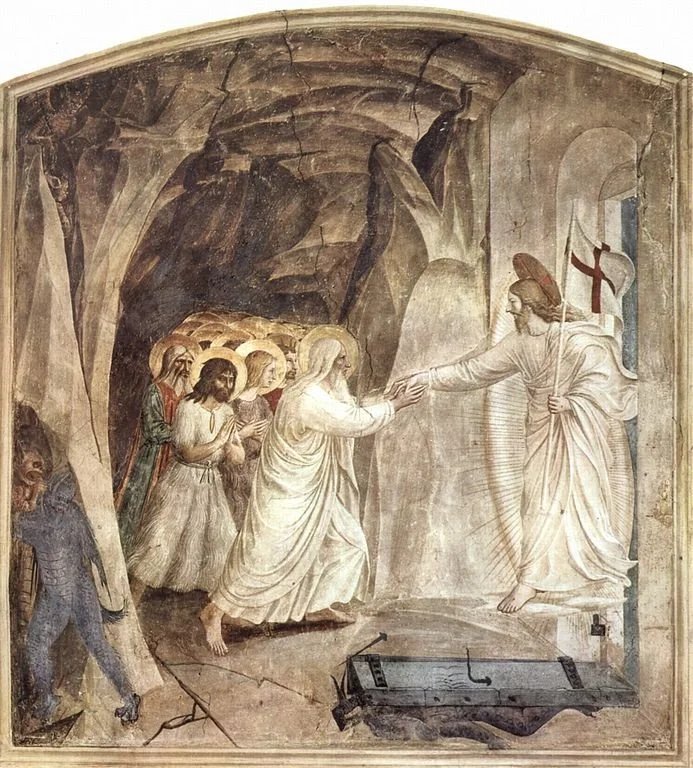Holy Saturday: Ultimate Solitude
Though sinless, the Lord has been put to death.
The world is in mourning as for an only son.
-Antiphon 1 from Morning Prayer of Holy Saturday
Following Jesus’ death and burial, the Apostles were left adrift. The horrific events of Good Friday had left them disappointed and disillusioned. The One who had been their focus and point of reference through years of travel and trials was gone: “God, it seemed,” reflected Cardinal Carlo Martini, “had become silent, he no longer spoke to them, and his help to understand the unfolding of history was no longer forthcoming… They no longer had the ability to see things from the perspective of the future; they could see no escape from the catastrophic situation in which all their illusions had come tumbling down” (from Our Lady of Holy Saturday).
Like the Apostles, the holy women who remained with Jesus in his final hours, and Mary, his mother, we are also left with silence on Holy Saturday. Today, we are left in a place of tension as we both reflect on the “The Mystery of Faith” celebrated on Holy Thursday and Good Friday and look toward the joy of the Paschal Vigil and Easter Sunday.
As I was reflecting on this silence and the sense of grief that weaves its way through these days, I was reminded of another time of absence, when those closest to Jesus sought him without finding him.
The Gospel of Luke tells us that when Jesus was twelve years old, his parents took him to Jerusalem to celebrate the feast of the Passover. Following the celebration, as they were making their way home, Mary and Joseph realized Jesus was missing and returned to Jerusalem, frantically searching for the boy. They finally found him, three days later, “in the temple, sitting in the midst of the teachers, listening to them and asking them questions” (2:46). When Mary asked why he had done this, Jesus answered quite simply, “Why were you looking for me? Did you not know that I must be about my Father’s work?” (2:49).
As I think of that first Holy Saturday, I think Jesus would have offered the same answer to his grief-stricken mother and closest friends: “Why are you looking for me? Do you not know that I must be about my Father’s work?”
Our shepherd, the source of the water of life, has died.
The sun was darkened when he passed away.
But now man's captor is made captive.
- This is the day when our Savior broke through the gates of death.
He has destroyed the barricades of hell,
overthrown the sovereignty of the devil.
- This is the day when our Savior broke through the gates of death.
Text: Responsory 2 from the Office of Readings for Holy Saturday; Image: “The Harrowing of Hell” by Fra Angelico in San Marco, Florence (1441-1442)
Here, we can recall that, in the Apostles Creed, we profess that “he descended into hell.”
This seems to be a simple statement, but it is overflowing with meaning. It is here that we can begin to enter more fully into the mystery of Holy Saturday: Jesus was about the Father’s work. It was on this day that Jesus entered into the darkest recesses of the human experience, bringing the Divine Presence into the reality of death itself:
In this "time-beyond-time", Jesus Christ "descended to the dead". What do these words mean? They mean that God, having made himself man, reached the point of entering man's most extreme and absolute solitude, where not a ray of love enters, where total abandonment reigns without any word of comfort: "hell." Jesus Christ, by remaining in death, passed beyond the door of this ultimate solitude to lead us too to cross it with him. We have all, at some point, felt the frightening sensation of abandonment, and that is what we fear most about death, just as when we were children we were afraid to be alone in the dark and could only be reassured by the presence of a person who loved us. Well, this is exactly what happened on Holy Saturday: the voice of God resounded in the realm of death. The unimaginable occurred: namely, Love penetrated "hell." Even in the extreme darkness of the most absolute human loneliness we may hear a voice that calls us and find a hand that takes ours and leads us out. Human beings live because they are loved and can love; and if love even penetrated the realm of death, then life also even reached there. In the hour of supreme solitude we shall never be alone: Passio Christi. Passio hominis.
As we wait and watch on this Holy Saturday, the silence of this day is inviting us to listen—to listen for that far-away, but ever-present cry of the One who has traversed death and hell to redeem even the ultimate solitude of death itself, as he declares: “Where, O death, is your sting? Where, of death, is your victory?” (1 Corinthians 15:55).
All-powerful and ever-living God,
your only Son went down among the dead
and rose again in glory.
In your goodness
raise up your faithful people,
buried with him in baptism,
to be one with him
in the eternal life of heaven,
where he lives and reigns with you
and the Holy Spirit, one God,
for ever and ever. Amen.
-from The Liturgy of the Hours
